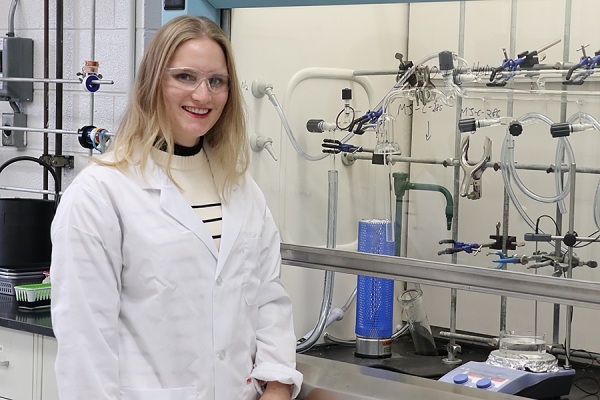 Leah Webster, a doctoral candidate at Imperial College London, sought out Windsor to be her academic home for three months.
Leah Webster, a doctoral candidate at Imperial College London, sought out Windsor to be her academic home for three months.
Given the chance to study anywhere in Canada, British PhD candidate Leah Webster sought out the University of Windsor to be her academic home for three months.
Webster, from Imperial College London, will spend 12-weeks in professor Marcus Drover’s lab in the Department of Chemistry and Biochemistry.
The visiting chemist was awarded a UK-Canada Globalink doctoral exchange scheme — a collaborative venture between UK Research and Innovation and MITACS. The scheme provides each qualifying student roughly $22,000 along with another $3,000 for supplies and consumables to carry out research at any Canadian university.
“One of the reasons I picked Dr. Drover’s group is the ‘green’ chemistry aspect that his team is looking into,” says Webster.
“He’s exploring the problems you see in the news every day — directly using the experience and knowledge you get from a chemistry degree.”
While in the Drover lab, Webster will explore a project created specifically for her. She will be synthesizing new molecules and investigating those that can reduce carbon dioxide to methanol, with the aim of preparing fuel alternatives from waste.
“The research is quite a hot topic in the science world right now, and I am hoping to help push towards the long-term goals of this project in the few months that I’m here,” she says.
Webster says she reached out to Drover because of his online global inorganic discussions during the pandemic. The research project allows her to explore a completely different project from her doctoral studies in the UK.
“I really enjoy travelling and I want to stay in academia, so having this experience in a new lab is useful and I think it builds on the skills that I already have,” she says.
“This project takes me out of my comfort zone, to see how other researchers perform their work, and hopefully I can bring some of my ideas from London and help Marcus’ group. In turn, I intend to take a lot of ideas from Marcus’ group and improve my chemistry as well.”
Drover says that he is elated that Webster can spend time with his team. His group has extensive research interest overlap with that of her home supervisor at Imperial College. Drover says he hopes this research opportunity will serve as a seed for future joint research projects.
“We have excellent supports here at UWindsor in the areas of synthetic chemistry that offer ambitious young researchers a mechanism to target long-standing problems of societal relevance,” says Drover.
“Unlocking global perspectives, opportunities, networks, and expertise are fundamental building blocks to our success as an institution.”
Webster plans to travel with the Windsor researchers to St. Catherine’s in November for the annual Inorganic Discussion Weekend.
“It is difficult for people in the UK and Europe to get to North American conferences and it can be hard to break into that chemistry community,” she says. “Now I can meet with new chemists and get ideas that will advance my research aims.”